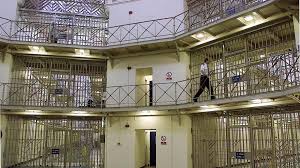Hundreds of additional inmates are set to be released early as the SNP-led Scottish Government struggles to manage the rising number of people in custody across the country.
Recently, the prison population in Scotland stood at 8,363, putting the system on the brink of recording its highest ever number of inmates. Ten prisons are currently rated as a red risk, with the same number either at or over full capacity. The population has grown by 200 in just the past three months.
Justice Secretary, Angela Constance has announced a new plan to release around 440 prisoners who are serving sentences of less than four years and are within 180 days of their release date. The policy will exclude individuals convicted of sexual crimes or domestic abuse.
Additionally, the government aims to align with UK-wide practices by allowing the deportation of foreign nationals currently serving sentences in Scotland.
Victims enrolled in the victim notification scheme will be automatically informed if the offender in their case is to be released.
Angela Constance stated that the recent surge in the number of prisoners is having a “serious impact” on both inmates and staff working within the prison system.
She said, “There is now a critical threat to the ongoing safe and effective functioning of the prison service due to the mounting pressure, and the ability to provide rehabilitative programmes has been drastically reduced. These concerns have also been echoed by Scotland’s chief inspector of prisons.”
She highlighted that the Scottish Government has taken several steps in recent years to reduce pressure on the prison system, including two early release schemes over the past year, expanded use of home detention, and substantial investment in alternatives to custody.
Despite these measures, the prison population continues to climb, mainly due to a rise in convictions for serious sexual offences and long-term sentences. Since 2020, the number of long-term prisoners has risen by 700—roughly equivalent to the capacity of HMP Addiewell.
Constance told the Scottish Parliament, “Let me be absolutely clear, this is not a decision I am making lightly. However, I believe the legal threshold has been met. Public safety and the wellbeing of victims and their families remain the top priority. I have done everything possible to take potential concerns into account in drafting the legislation.”
She also noted that both the Scottish Prison Service and the Prison Governors’ Association had contacted her directly, stressing the “urgent need to reduce the current prison population.”
Emergency legislation enabling the early release of prisoners will now be brought before MSPs in Holyrood for approval.
The Prison Officers’ Association has expressed support for the plan, but warned that early release should not be seen as a long-term solution to overcrowding.
The association’s Scottish secretary, Phil Fairlie said, “Our members have been working under extreme pressure for an extended period, and it’s having a significant toll. Things cannot carry on like this. Many officers are operating in high-risk, stressful environments, and something must change.”
He added that the recent letter from the Scottish Prison Service’s chief executive to the government painted a stark but accurate picture of the strain the system is under. “It’s telling just how serious the situation has become when the chief executive feels compelled to speak out so directly. We appreciate her honesty and the attention she’s brought to the realities on the ground,” he said.
The move has faced strong criticism from opposition parties in the Scottish Parliament.
Pauline McNeill MSP, Scottish Labour’s spokesperson on justice, described the situation as “complete system failure.” She said, “For years, the SNP has ignored warnings about our overstretched prison system and now resorts to short-term fixes.”
She also criticised the cost and limited capacity of the new prison intended to replace HMP Barlinnie. “It will cost over £1 billion of taxpayers’ money and will only provide 357 additional places, nowhere near enough to address the current level of overcrowding.”
McNeill said it is now crucial that the justice secretary holds productive talks with the Home Office, especially after indicating a renewed focus on deporting foreign national offenders.



